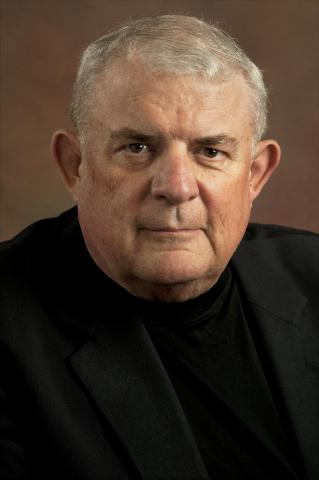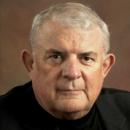‘Extraordinary Intuition’
Selecting Rhodes Scholars has been an annual “job and pleasure” for Senior Lecturer in Law Dennis Hutchinson. He’s been doing it for more than three decades, longer than just about anyone else in America.
A strong candidate, he says, has a stellar academic record, as well as a clear sense of purpose and a high level of engagement in and out of class. But it takes more than intellect and drive to meet the rigorous criteria set out 116 years ago in the will and bequest of Cecil J. Rhodes, the British magnate who sought to give exceptional students the opportunity to attend the University of Oxford—his alma mater—by creating an international fellowship program that emphasizes courage, public service, and moral force of character.
These are the intangible qualities that Hutchinson sometimes spots in simple moments of candor, such as when a candidate says, “I don’t know,” or “I made a mistake.”
“One of the classic questions that gets asked [of candidates] is, 'Have you ever by your own behavior been ashamed of yourself?’ And the answer can be remarkably revealing,” said Hutchinson, a former Rhodes Scholar who recently retired as one of the longest-serving volunteers for the Rhodes Trust. “Most candidates who are prepped for this toot their own horns, in modest fashion of course. But to own up to a mistake—that’s real sign of character.”
The Rhodes Trust, the Oxford, England-based organization that bestows the prestigious scholarships, will honor Hutchinson’s 35 years of service on November 16 with the George Parkin Service Award, which recognizes outstanding contributions by members of the Rhodes Scholar community. Hutchinson—who is also the William Rainey Harper Professor in the College, Master of the New Collegiate Division, and Associate Dean of the College—was among six Parkin Award recipients for the 2017-18 academic year.
“No one in the country, and I am comfortable saying probably in the world, has devoted more time, wisdom, conscientiousness, and passion to the selection of Rhodes Scholars than Dennis,” said Elliot Gerson, American Secretary of the Rhodes Trust. “When I became responsible for the Scholarship in the United States, he was my most important advisor. And he has remained my most important advisor. Dennis has extraordinary intuition regarding the character, leadership, and values that will elevate the careers of the brilliant young people who come before us.”
Each year, 32 Americans are among the 95 people selected as Rhodes Scholars. Two come from each of 16 regions in the United States, and they are selected by committees each composed of six former Rhodes Scholars and a chairperson, who is not a Rhodes Scholar. Hutchinson has served on four regional committees, most recently on one that covers Michigan, Minnesota, Wisconsin, and West Virginia. For the past 17 years, he’s served as a district secretary, responsible for organizing the competition, making arrangements for committee members, and communicating with both candidates and the representatives of the Rhodes Trust. He also served between 1998 and 2006 on the board of the Association of American Rhodes Scholars, an alumni body that organizes regional gatherings and raises money for the Rhodes Trust.
“My service to the Trust in its various forms has really been a logical extension of what I do for the University,” Hutchinson said. “I'm trying to encourage able, curious people with strong character to broaden their horizons and find opportunities that they might not even be able to imagine.”
Hutchinson said the committee interviews 14 finalists each year, choosing two who will be among the 32 American winners. Those are announced each year on the Saturday before Thanksgiving—making “every November a cause of optimism for me,” Hutchinson said.
“[I've encountered] some remarkable life stories,” Hutchinson said. “One of our recent winners was born in a Kenyan refugee camp—he had escaped from war-torn Africa. Others have had leadership roles in their respective universities. One recent winner was trying to establish a connection between the Muslim and Jewish communities on the campus. There are many people who are this accomplished, this determined, and this selfless. There is hope.”
Hutchinson, who earned an undergraduate degree from Bowdoin College in 1969, attended Oxford’s Magdalen College as a Rhodes Scholar in the 1970s, earning a degree in law. He later earned an LLM from the University of Texas at Austin.
When he was just 27 and clerking in Atlanta for Judge Elbert P. Tuttle of the US Court of Appeals for the Fifth Circuit, he was recruited to serve on a Rhodes selection committee. The trustees wanted multiple forms of diversity on the committees, including age, Hutchinson said.
“I had studied in Oxford recently … and I could talk about programs and changes in the culture, and the strengths and weaknesses of the university experience,” he said.
He served the Rhodes Trust in Georgia for a year. He chose to continue his service on a different Rhodes selection committee when he moved to Washington, DC, where he clerked the US Supreme Court—first for Justice Byron White and later for Justice William O. Douglas—before launching his academic career at American University and Georgetown University Law Center. He joined the University of Chicago in 1981 and continued to serve the Rhodes Trust on the Illinois committee for the next decade.
He took a break from the Rhodes Trust for several years in the 1990s to chair the University of Chicago’s British scholarships committee, which reviews and endorses University of Chicago candidates. (The University has a strong history of successful Rhodes Scholar candidates, including Law School alumnus Joshua Pickar, ’16.) Hutchinson returned to the Rhodes Trust in the late 1990s, and became a district secretary in 1998.
Ultimately, Hutchinson hopes that his service has opened up possibilities for the most promising young scholars, the ones who will not only to pursue their intellectual passions but to act on their desire to do good in the world.
“It is one thing to get the trophy,” Hutchinson said. “It's another thing to live it.”

